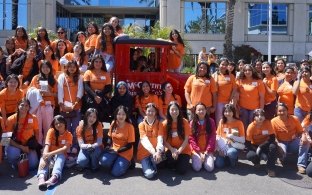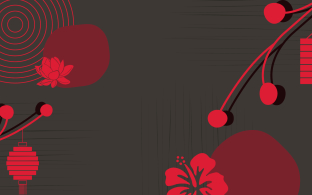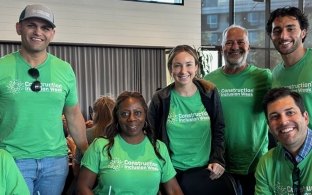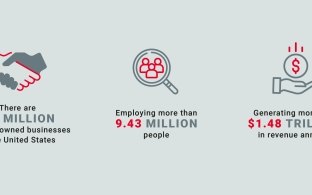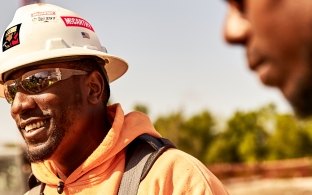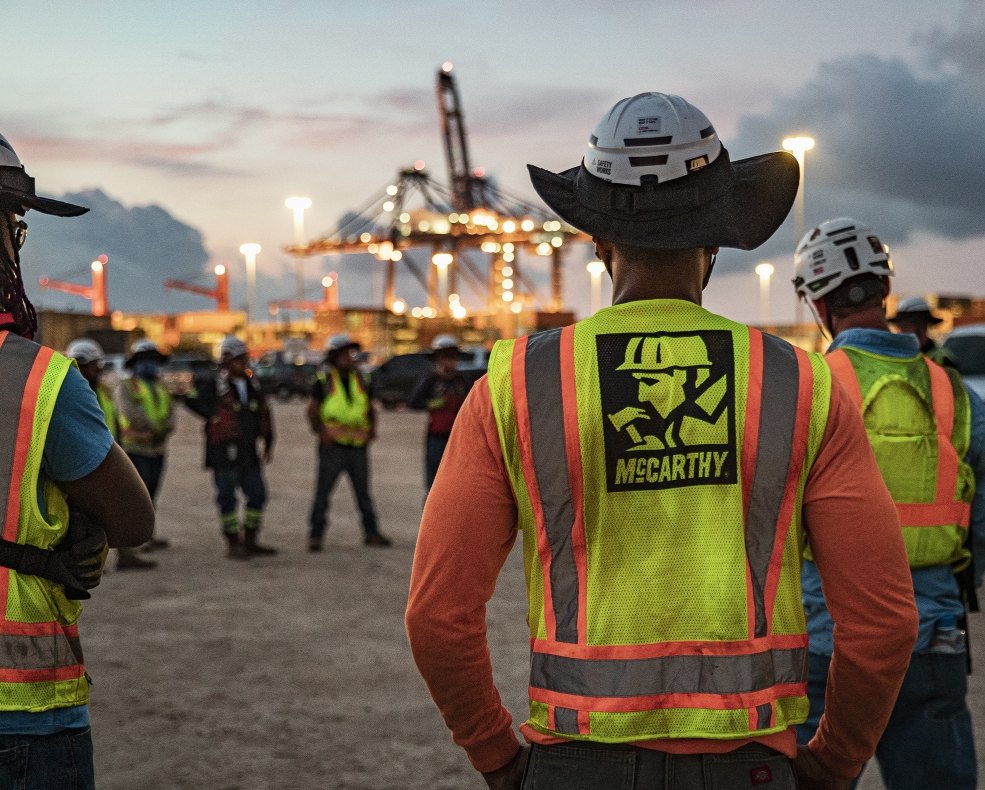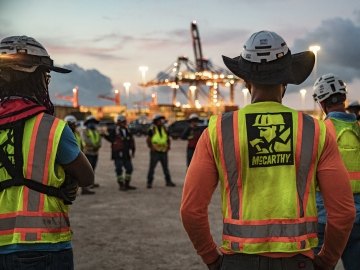Celebrating Asian American and Pacific Islander Heritage Month
McCarthy employee-partners shared their personal stories, greatest lessons and how they celebrate their heritage.


MICHAEL KIM
Vice President, Integrated Design Delivery, Southern Pacific Region

I was born in the U.S. and both my parents are Korean immigrants. Both suffered terribly during the Korean war as my father was orphaned as a teenager and my mother lost her father and three brothers from a U.S. bombing raid. Even after such an awful loss she forgave and held no animosity to America. To the contrary, they came to America looking for a better life — and in many ways have lived the American dream. My wife is from India and we have two beautiful daughters, so our little family is a microcosm of the diversity of AAPI. But even within the AAPI there are many latent cultural biases, as an example, my wife and I had to elope because my parents disapproved. Fortunately, all is good now. It's amazing how children can heal all wounds.
My greatest lesson: Everything in life has to do with relationships – friends, family, coworkers, neighbors, the guy at the supermarket, etc. Any relationship requires one to be present in the moment fully engaged. Ultimately, relationships between different people and cultures will build connections that we desperately need right now.
DAVID ALOFAITULI
Regional Safety Manager, Southwest Region

I grew up in a household of five brothers and sisters in California. Our parents were born on the South Pacific islands of Samoa (American & Western) and moved to California in search of a "better" life for us. My father told us stories about climbing mountains each day and how much work was needed back in his village.
My greatest lesson: Our parents worked hard; I grew up seeing both my mom and dad work every day to support six kids. My parents expressed the importance of family and prayer to keep us grounded in our priorities in life. Though they’ve passed, I can’t help but remember how they have instilled work ethic, family and prayer into our lives.
KAYLA NGO
Marketing Coordinator, Southern Region

I am a first-generation Vietnamese-American. My parents immigrated to the U.S. in the early 1990s due to the Amerasian Homecoming Act. On their individual journeys to the United States, there was a camp they had to stay at before they could be processed and legally enter the country with their green cards. It just so happened that this camp was in the Philippines, which was where they met. They eventually were married after months of letter correspondence across the ocean, since my father’s family was relocated to the U.S. before my mother’s. My family settled in Rome, Ga., after a few years in an Atlanta suburb, and we’ve been there ever since. I grew up with an older sister and a plethora of family surrounding me, a childhood I’m thankful for every day.
My greatest lesson: Be proud of where you come from and your customs, because just letting them disappear into the background is a disservice to your ancestors. Something I wish people knew about AAPI culture is that to appreciate it, a myopic view of society won’t work. Differences and an omnipresent perspective are what make a community special, amazing, and inclusive at its core.
VIVIAN LI
Project Manager, Northern Pacific Region

We may come out as the quiet ones because we were taught to be careful with our words. But just because I am a quiet worker, I can speak up when the right time comes. In my point of view, being quiet does not mean I don’t know the answer or that I am intimidated - it simply means I am reading the situation and seeing all perspectives. As repetitive as it may sound, diverse culture brings diverse perspectives and innovations.
My greatest lesson: It is very important to have diversity in thoughts, not only to challenge ourselves to be better, but to expand our talent pool and expand our portfolio to fit into more clients’ diverse culture/business model. Don’t be scared, the sky is your own limit. Your voice brings value no matter how small you may think it is.
ROBERT BROWN
Superintendent, Southwest Region

My mother was born in 1941 and raised in American Samoa in the village of Ili’Ili. Her family moved to Oahu, Hawaii when she was 12. She met my father in 1962 while he was serving in the U.S. Marine Corps, and they married a year later. I was born in Honolulu in 1967. A union pipefitter by trade, I have been fortunate enough to have work on large-scale projects around the world and loved every minute of it. The largest project I ever worked on was the Penn Chemicals Project outside of Pittsburgh, and we had around 6,300 craft and staff on site. To juggle a site that large and manage anywhere from 300–1,000 direct report craft at any given time is a great accomplishment in my eyes. I have worked all over the states, China, Indonesia, Malaysia and a short stint in Thailand. My mother had a very large family with two parents and 13 children.
How I celebrate AAPI month: Growing up, we ate a lot of what my mother’s family ate — traditional Samoan food and island food. We used to celebrate AAPI month by getting together with family and food, telling stories, singing and dancing. I wish everyone knew how nice, caring, loving and family-oriented the Samoan people are as a whole. Being half Samoan and half American has given me the best of both worlds and gives me a great perspective on life in general.
HELEN JUAN
MEP Preconstruction Director, Northern Pacific Region

As a Filipino-American, I’ve always heard of my parents’ aspirations to live the American dream by working hard in school, attending a good college and entering a white-collar profession. I sensed a bit of their disappointment when I joined the Air Force and chose a path in construction, but in the end they really saw it was the right path for me. Being in the military and construction is about making things happen, and that’s what I enjoy being part of.
How do you celebrate AAPI month: I celebrate my heritage by sharing it with my co-workers and friends through food and unique customs. I was recently on a big family call with many mixes ethnicities from marriages and we attempted to give everyone Filipino nicknames. It was hilarious and endearing.
ADEEL MALIK
Vice President, Estimating, Southern Region

I was born in Pakistan, grew up in Zambia and moved to the U.S. when I was 14, so pretty much raised as a citizen of the world. Growing up in Zambia was a great experience and helped shape me to be the person I am today. I had friends that were from all over the world and was able to experience their cultures and experiences at an early stage of my life. Looking back, despite some of the geo-political issues that were going on in the world at the time, we were able to cultivate friendships and relationships without any biases towards each other. Inclusion is critical to our success.
My greatest lesson: Having an Inclusive culture helps foster diversity of thought/experiences and challenge the way we’ve always done things. It celebrates our differences. It promotes genuine engagement and raises motivation that are critical factors to employee retention. As a community builder, we take pride in the communities where we work and live in by participating in local/trade organizations, programs and events that have a positive impact on our communities. We value the well-being, growth, development, and long-term financial success of our employee-partners like no other construction company.
KIM TROTTER
Talent Acquisition Manager, Southern Pacific Region

My grandmother married an American pilot stationed in Vietnam during the Vietnam war. When American troops started to withdraw from Vietnam, my grandmother and her new husband made the very difficult decision to take their newborn sons but leave my mother behind with my great-grandmother. My mother grew up in Vietnam for the next 19 years and eventually met my dad. By this time, the Communists had taken over the country and life was incredibly difficult for Southern Vietnamese people, especially those who had any affiliation to the Americans. Because of this, my parents and several uncles devised a plan to escape the country by boat. It took them five days before they reached Thailand. I was born in that refugee camp and was there for only three months before the sponsorship was approved for the U.S; then we were moved to North Carolina. I grew up in a small town in North Carolina with my three siblings during a time when there was still a lot of racial tension and animosity towards foreigners. My grandmother was Vietnamese, my step-grandfather was African-American, and my family stuck out like a sore thumb in a predominantly white neighborhood. Eventually I made some good friends, excelled in academics, and was admitted into California-Berkeley. I had the opportunity to major in Ethnic Studies and part of my studies included researching and interviewing my own family members to understand their immigration journey. That really opened my eyes to their experiences and the difficulties they faced before the age of 20.
What I want to share to others: The one thing I wish everyone knew about Asian and Pacific Islander culture is that it’s not one monolithic culture or group. Each Asian country has its own uniqueness to it and even within that one country, there are so many variances within the people groups, geographies, and sub-cultures
JANELLE NEILL
Marketing Manager, Southwest Region

Hafa Adai! That’s hello in Chamorru, the native language and culture of Guam, where my mom’s family is from. My three siblings and I got to experience our island culture while growing up by spending most of our summers and frequent visits with extended family in San Diego, which is where my mom’s family of 15 immigrated to in the 1960s. Our trips to San Diego are some of my most treasured memories. Every get-together was a family reunion because of the sheer number of aunties, uncles and cousins. We’d spend days preparing traditional family recipes from lumpia, titiyas (sweet flatbread), kadu kelaguen (diced chicken and coconut side dish), fina dene, pancit, red rice and so much more! We finally outgrew getting together at houses and had to have our last reunion at a hotel conference center.
My greatest lesson: Growing up so close with our family taught us amazing values of respecting our elders, taking care of each other — and that family wasn’t just people in your bloodline, but that your family can be anyone you choose.
ALICE NGUYEN
Vice President, Preconstruction, Northern Pacific Region

I was born in Vietnam and immigrated to the states in the late 1960s as a young child with my parents and siblings. We were part of a small Vietnamese community in San Francisco and knew everyone in the area who were from our country. We shopped in Chinatown in those days as you were able to buy very large bags of rice there. The memory that remains with me from those early years is the abundance of everything in America – from oranges being available year-round, to the large department stores full of clothing and housewares. We landed in paradise!
How I celebrate AAPI month: I will celebrate AAPI Heritage with lots of meals! People connect through food and it’s the common denominator across multiple Asian cultures – we celebrate by eating! Dim Sum, Sushi, Banh Mi, Pho, Loco Moco – I’m all in!
